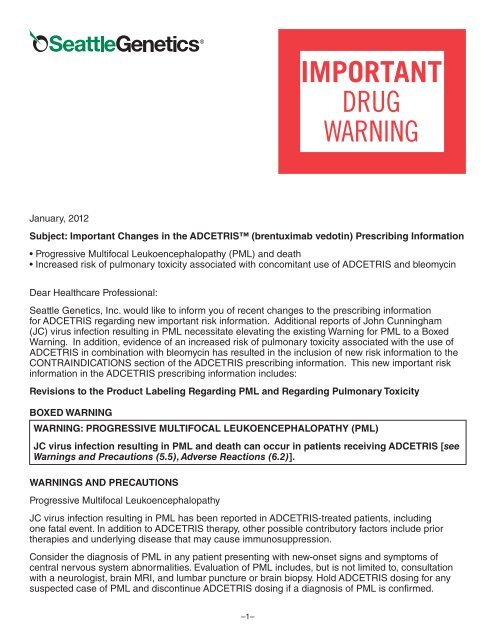Dear HCP Letter - PDR.net
Dear HCP Letter - PDR.net
Dear HCP Letter - PDR.net
Create successful ePaper yourself
Turn your PDF publications into a flip-book with our unique Google optimized e-Paper software.
IMPORTANTDRUGWARNINGJanuary, 2012Subject: Important Changes in the ADCETRIS (brentuximab vedotin) Prescribing Information• Progressive Multifocal Leukoencephalopathy (PML) and death• Increased risk of pulmonary toxicity associated with concomitant use of ADCETRIS and bleomycin<strong>Dear</strong> Healthcare Professional:Seattle Ge<strong>net</strong>ics, Inc. would like to inform you of recent changes to the prescribing informationfor ADCETRIS regarding new important risk information. Additional reports of John Cunningham(JC) virus infection resulting in PML necessitate elevating the existing Warning for PML to a BoxedWarning. In addition, evidence of an increased risk of pulmonary toxicity associated with the use ofADCETRIS in combination with bleomycin has resulted in the inclusion of new risk information to theCONTRAINDICATIONS section of the ADCETRIS prescribing information. This new important riskinformation in the ADCETRIS prescribing information includes:Revisions to the Product Labeling Regarding PML and Regarding Pulmonary ToxicityBOXED WARNINGWARNING: PROGRESSIVE MULTIFOCAL LEUKOENCEPHALOPATHY (PML)JC virus infection resulting in PML and death can occur in patients receiving ADCETRIS [seeWarnings and Precautions (5.5), Adverse Reactions (6.2)].WARNINGS AND PRECAUTIONSProgressive Multifocal LeukoencephalopathyJC virus infection resulting in PML has been reported in ADCETRIS-treated patients, includingone fatal event. In addition to ADCETRIS therapy, other possible contributory factors include priortherapies and underlying disease that may cause immunosuppression.Consider the diagnosis of PML in any patient presenting with new-onset signs and symptoms ofcentral nervous system abnormalities. Evaluation of PML includes, but is not limited to, consultationwith a neurologist, brain MRI, and lumbar puncture or brain biopsy. Hold ADCETRIS dosing for anysuspected case of PML and discontinue ADCETRIS dosing if a diagnosis of PML is confirmed.–1–
CONTRAINDICATIONSPulmonary ToxicityConcomitant use of ADCETRIS and bleomycin is contraindicated due to pulmonary toxicity. In aclinical trial which included the combination of ADCETRIS with ABVD (Adriamycin, bleomycin,vinblastine, dacarbazine), the rate of non-infectious pulmonary toxicity was increased relative tohistorical observations of ABVD alone. Patients typically reported cough and dyspnea. Interstitialinfiltration and/or inflammation were observed on radiographs and computed tomographic imaging ofthe chest. Most patients responded to corticosteroids.SUMMARY OF INFORMATION ON RECENT PML CASESTo date, Seattle Ge<strong>net</strong>ics has received two reports of confirmed PML and one report of suspectedPML in patients who received treatment with ADCETRIS. Presenting signs and symptoms consideredto be consistent with PML included speech impairment, problems thinking, memory lapses, unilateralweakness, impairment in coordination and balance, and sensory deficits. The onset of these symptomsoccurred following 2, 3 or 8 cycles of ADCETRIS. The patients had multiple risk factors for developingPML, including a history of lymphoproliferative disease (Hodgkin lymphoma or anaplastic large celllymphoma), prior treatment with multiple chemotherapy regimens, prior targeted radiation therapyand/or prior stem transplantation. PML was diagnosed based on clinical symptoms, MRI findings anddetection of JC virus by PCR in the CSF or by histology on biopsy. One of these cases was fatal whilethe other two patients remain in hospice care.Physicians should consider a possible diagnosis of PML in any patient currently receiving or whohas received ADCETRIS in the past, and presents with new onset of signs or symptoms of CNSabnormalities such as changes in mood, unusual behavior, confusion or other cognitive changes, lossof balance, blurred vision or loss of vision, decreased strength, control, or sensation in one arm orleg or change in the ability to walk or talk. Consultation with a neurologist and performance of a brainMRI and/or lumbar puncture with analysis of cerebrospinal fluid by polymerase chain reaction for JCvirus and/or brain biopsy should be considered. Hold ADCETRIS dosing for any suspected case ofPML and discontinue ADCETRIS dosing if a diagnosis of PML is confirmed. Instruct patients to reportchanges in mood or usual behavior, confusion, thinking problems, loss of memory, changes in vision,speech, walking, decreased strength or weakness on one side of the body.The factors leading to reactivation of latent JC virus are not fully understood. In addition toADCETRIS, other possible contributory factors include underlying disease and prior therapies thataffect the immune system.SUMMARY OF INFORMATION ON CASES OF PULMONARY TOXICITY REPORTED WITHADCETRISSeattle Ge<strong>net</strong>ics is conducting a phase 1 clinical trial of ADCETRIS in combination with Adriamycin,bleomycin, vinblastine, and dacarbazine (ABVD) or AVD as front-line therapy for Hodgkin lymphoma(HL). Noninfectious pulmonary toxicity has been observed in some subjects enrolled in the ABVD +ADCETRIS arm of the study. Patients have presented with cough and dyspnea. Interstitial infiltrationand/or inflammation have been observed on X-ray and computed tomography of the chest. Mostpatients have responded favorably to corticosteroid therapy.The use of ADCETRIS in the front-line HL setting is investigational and is not an approved indicationin the prescribing information.The frequency of pulmonary toxicity in the ABVD + ADCETRIS arm of the phase 1 trial isapproximately 40%, compared to a frequency of 10-25% most commonly reported in the literaturewith bleomycin-based regimens. No pulmonary toxicity has been observed thus far in the AVD +ADCETRIS arm of the study. To date, monotherapy with ADCETRIS has not been associated with aclinically meaningful risk of pulmonary toxicity.–2–
Therefore, ADCETRIS and bleomycin should not be administered concomitantly.Seattle Ge<strong>net</strong>ics will continue to monitor the safety of ADCETRIS through establishedreporting mechanisms. You can report adverse reactions with ADCETRIS to Seattle Ge<strong>net</strong>icsat 855-4SEAGEN (855-473-2436), or to the FDA at www.fda.gov/medwatch or by mail toMedWatch, Food and Drug Administration, 5600 Fishers Lane, Rockville, MD 20852-9787.IMPORTANT INFORMATION ABOUT ADCETRIS (BRENTUXIMAB VEDOTIN)INDICATIONSADCETRIS is a CD30-directed antibody-drug conjugate indicated for:• The treatment of patients with Hodgkin lymphoma after failure of autologous stem cell transplant(ASCT) or after failure of at least two prior multi-agent chemotherapy regimens in patients who arenot ASCT candidates.• The treatment of patients with systemic anaplastic large cell lymphoma after failure of at least oneprior multi-agent chemotherapy regimen.These indications are based on response rate. There are no data available demonstratingimprovement in patient reported outcomes or survival with ADCETRIS.Please see the enclosed ADCETRIS full prescribing information.If you have any questions or require additional information regarding the use of ADCETRIS,please contact Seattle Ge<strong>net</strong>ics Medical Information directly at 855-4SEAGEN (855-473-2436) ormedicalinformation@seagen.com.Sincerely,Thomas C. Reynolds, MD, PhDChief Medical OfficerSeattle Ge<strong>net</strong>ics, Inc.–3–


